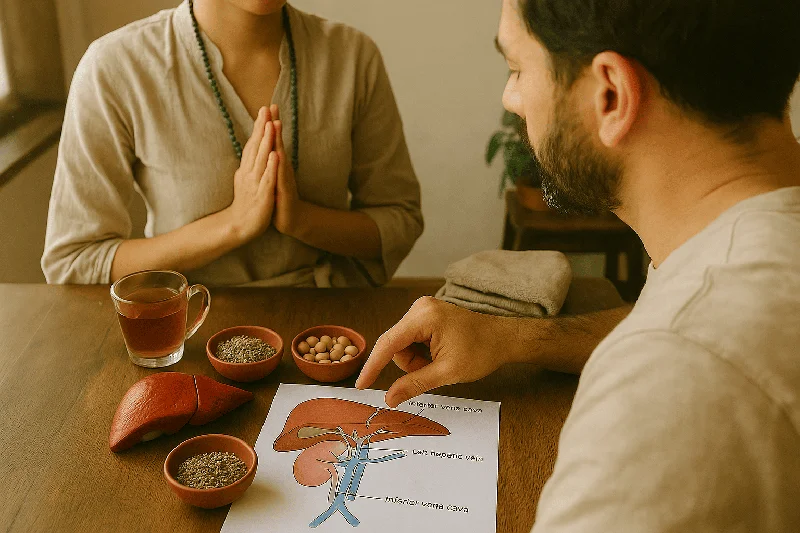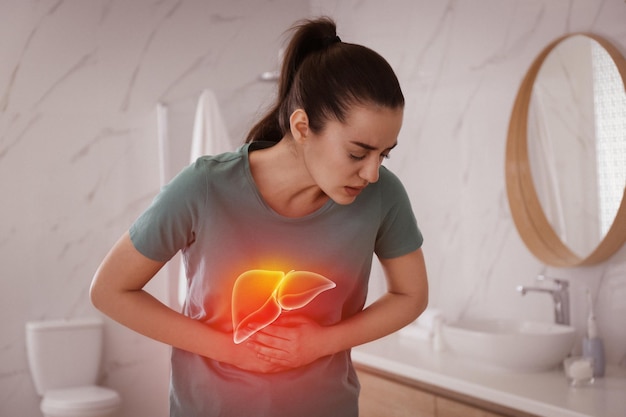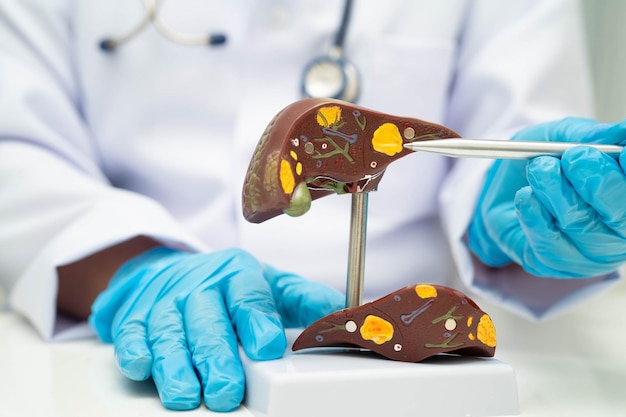Fatty Liver Grade 2 Ayurvedic Treatment – Holistic & Scientific Approach

Fatty liver disease, especially at Grade 2, has become a growing health concern worldwide. While conventional medicine offers treatments centered around lifestyle changes and medications, Ayurveda provides a holistic approach that integrates herbal remedies, detoxification techniques, and diet modifications. In this article, we explore fatty liver grade 2 ayurvedic treatment from both traditional and modern scientific perspectives, offering balanced insights for readers seeking a natural pathway to liver health.
Disclaimer: This article is intended for informational purposes only and is not a substitute for professional medical advice. Always consult a qualified healthcare provider before beginning any new treatment regimen.
Understanding Fatty Liver Grade 2
Fatty liver disease is characterized by an abnormal buildup of fat in liver cells. Grade 2 fatty liver indicates a moderate accumulation, which can lead to inflammation and potential progression to more serious liver conditions if not addressed promptly.
Key Features of Fatty Liver Grade 2
- Moderate fat accumulation: Visible on imaging studies, indicating more fat deposition than Grade 1.
- Inflammatory changes: Mild to moderate inflammation that may not yet cause significant symptoms.
- Risk factors: Poor diet, sedentary lifestyle, obesity, insulin resistance, and alcohol consumption.
Fatty liver disease is often a silent condition, with many individuals unaware of its progression until routine tests or complications arise. This early stage, however, is an ideal time for intervention through lifestyle changes and complementary therapies such as Ayurveda.
The Ayurvedic Perspective on Liver Health
Ayurveda, a 5,000-year-old holistic system of medicine, views the liver as a central organ in maintaining overall health and balance. In Ayurvedic texts, the liver is intricately linked to the concept of Medo Dhatu (fat tissue) and is closely associated with the Pitta Dosha, which governs metabolism and digestion.
Core Principles in Ayurvedic Liver Care
- Holistic Balance: Ayurveda emphasizes balancing the three doshas (Vata, Pitta, and Kapha) to promote optimal organ function.
- Detoxification (Panchakarma): Cleansing the body of toxins (ama) through specialized detox techniques helps restore liver health.
- Herbal Remedies: Natural herbs and formulations are used to support liver detoxification, improve digestion, and reduce inflammation.
- Dietary Adjustments: Emphasis on fresh, whole foods, and specific dietary guidelines tailored to one’s dosha to reduce the liver’s burden.
Classical texts such as the Charaka Samhita and Sushruta Samhita detail various herbs and therapies that are used to manage liver disorders, showcasing Ayurveda’s long-standing commitment to liver health.
Core Ayurvedic Treatments for Fatty Liver Grade 2
Ayurvedic treatment for fatty liver at Grade 2 is multi-faceted, focusing on cleansing, nourishment, and restoration of balance. Here, we detail the primary modalities:
1. Herbal Remedies
Ayurvedic herbs play a pivotal role in managing fatty liver by promoting detoxification and reducing inflammation. Some key herbs include:
- Kutki (Picrorhiza kurroa): Renowned for its hepatoprotective properties and ability to stimulate liver cell regeneration.
- Punarnava (Boerhavia diffusa): Helps reduce water retention and supports liver detoxification.
- Bhumyamalaki (Phyllanthus niruri): Known for its antioxidant and anti-inflammatory properties, aiding in liver repair.
- Turmeric (Curcuma longa): Contains curcumin, which has demonstrated anti-inflammatory and antioxidant benefits in several studies.
These herbs are often prepared as decoctions, powders, or incorporated into dietary supplements. For instance, a combination of Kutki and Punarnava is commonly used in Ayurvedic formulations aimed at liver cleansing.
2. Detoxification Techniques (Panchakarma)
Panchakarma is a comprehensive detox program in Ayurveda designed to eliminate accumulated toxins. Key components include:
- Vamana (Therapeutic Emesis): Helps expel excess Kapha, which may contribute to fat accumulation.
- Virechana (Purgation Therapy): Targets the elimination of toxins through the gastrointestinal tract.
- Basti (Medicated Enema): Aims to balance Vata and cleanse the colon, indirectly benefiting the liver.
These therapies are tailored to the individual’s constitution (Prakriti) and the severity of the condition, ensuring a personalized approach to treatment.
3. Diet and Lifestyle Modifications
Dietary changes are central to Ayurvedic treatment. Recommendations typically include:
- Light, Easily Digestible Foods: Favoring soups, stewed vegetables, and whole grains.
- Reduction of Heavy, Oily Foods: Minimizing intake of fried and processed foods.
- Inclusion of Bitter and Astringent Tastes: Foods like leafy greens, turmeric, and certain herbs support liver detox.
- Regular Eating Schedule: Helps stabilize metabolism and reduce the liver's workload.
Additionally, daily practices such as yoga and meditation are encouraged to reduce stress, which is a known aggravator of liver inflammation.
Modern Scientific Insights into Ayurvedic Treatments
While Ayurveda has been practiced for millennia, modern scientific research has begun to validate some of its principles and treatments. Here are some notable findings:
Evidence Supporting Ayurvedic Herbs
- Kutki (Picrorhiza kurroa): Several studies suggest that Kutki exhibits hepatoprotective effects, reducing liver enzyme levels and improving overall liver function. Research published in journals like the Journal of Ethnopharmacology indicates its potential in mitigating liver damage.
- Turmeric (Curcuma longa): Curcumin, the active ingredient in turmeric, has been extensively studied for its anti-inflammatory and antioxidant properties. Clinical trials have demonstrated its effectiveness in reducing liver inflammation and oxidative stress.
- Bhumyamalaki (Phyllanthus niruri): Studies in the Indian Journal of Gastroenterology have highlighted its potential in supporting liver health through its antioxidant properties.
Integration of Ayurveda with Modern Medicine
Modern hepatology increasingly recognizes the value of a holistic approach to liver health. While conventional treatments focus on controlling risk factors (such as managing diabetes, obesity, and cholesterol levels), integrating Ayurvedic principles may provide additional benefits by addressing the underlying imbalances in the body.
- Complementary Use: Some clinical trials have shown that combining herbal supplements with standard medical treatments can enhance patient outcomes, though more rigorous studies are needed for conclusive evidence.
- Safety and Efficacy: While Ayurvedic treatments are generally safe when administered correctly, scientific studies emphasize the importance of quality control and standardized dosages to avoid potential adverse effects.
Researchers continue to explore how these natural remedies interact with modern pharmaceuticals, and ongoing studies may soon provide a clearer picture of their full therapeutic potential.
Integrating Ayurvedic Practices with Modern Healthcare
For individuals diagnosed with fatty liver Grade 2, a collaborative approach that marries Ayurvedic wisdom with conventional medical care can be highly effective. Here are some steps to consider:
A Collaborative Treatment Plan
- Consultation with Healthcare Providers: Engage both your Ayurvedic practitioner and your primary care physician to create a cohesive treatment plan.
- Regular Monitoring: Utilize liver function tests and imaging studies to monitor progress, ensuring that the integrated approach is effective.
- Personalized Therapy: Tailor the combination of Ayurvedic herbs, dietary changes, and modern medications based on individual health status and response to treatment.
Benefits of a Dual Approach
- Holistic Healing: Combining therapies can address both symptoms and underlying causes, promoting overall wellness.
- Reduced Side Effects: Natural herbal remedies, when used appropriately, may help minimize the side effects often associated with conventional drugs.
- Sustainable Lifestyle Changes: Incorporating Ayurvedic practices encourages long-term lifestyle modifications that can prevent recurrence.
Lifestyle and Dietary Tips for Supporting Liver Health
Beyond specific treatments, daily lifestyle adjustments play a critical role in managing fatty liver disease. Here are some actionable tips:
Dietary Recommendations
- Increase Fiber Intake: Include plenty of fruits, vegetables, and whole grains to support digestion and toxin elimination.
- Hydrate Adequately: Drinking enough water aids in flushing out toxins and supports metabolic processes.
- Emphasize Plant-Based Foods: Focus on a diet rich in antioxidants by consuming berries, nuts, and green leafy vegetables.
- Moderate Protein Consumption: Opt for lean proteins such as legumes, fish, or chicken to reduce the burden on the liver.
- Limit Alcohol: Avoid or minimize alcohol consumption as it can exacerbate liver inflammation and fat accumulation.
Lifestyle Modifications
- Regular Exercise: Engage in moderate physical activity (e.g., walking, yoga, or swimming) to maintain a healthy weight and improve circulation.
- Stress Management: Incorporate mindfulness practices, meditation, or deep breathing exercises to reduce stress—a known contributor to liver inflammation.
- Sleep Hygiene: Ensure adequate and quality sleep to support the body's natural detoxification processes.
- Avoid Toxins: Reduce exposure to environmental toxins by choosing natural cleaning and personal care products whenever possible.
Frequently Asked Questions (FAQ)
Q1: What is Fatty Liver Grade 2 and how serious is it?
A: Grade 2 fatty liver signifies moderate fat accumulation in the liver. While it may not cause severe symptoms initially, it requires timely intervention to prevent progression to more serious liver conditions.
Q2: How does Ayurvedic treatment help with fatty liver?
A: Ayurvedic treatment addresses fatty liver by balancing the body’s doshas, detoxifying the liver through Panchakarma, and using herbal remedies that support liver health. These treatments work holistically to restore balance and reduce inflammation.
Q3: Are there scientific studies supporting Ayurvedic treatments for fatty liver?
A: Yes, several studies have shown that herbs like Kutki, turmeric, and Bhumyamalaki possess hepatoprotective properties. However, more large-scale clinical trials are needed to confirm their efficacy fully.
Q4: Can I combine Ayurvedic treatments with conventional medications?
A: Many patients benefit from an integrative approach. Always consult both your Ayurvedic practitioner and your healthcare provider to ensure that treatments are safe and complementary.
Q5: What lifestyle changes can I implement along with Ayurvedic treatments?
A: A balanced diet rich in fiber, regular exercise, stress management practices, and adequate hydration are key components in supporting liver health.
Conclusion
The journey to overcoming fatty liver Grade 2 involves a harmonious blend of ancient Ayurvedic wisdom and modern scientific insights. Fatty liver grade 2 ayurvedic treatment offers a multi-dimensional approach—incorporating herbal remedies, detoxification methods, and lifestyle modifications—that can help restore liver function and promote overall well-being.
By embracing both traditional practices and evidence-based medicine, individuals can create a personalized treatment plan that not only targets the symptoms but also addresses the root causes of liver imbalance. If you’re exploring natural ways to improve liver health, consider discussing Ayurvedic options with your healthcare provider.
Share your thoughts, experiences, or questions in the comments below, subscribe to our newsletter for more holistic health insights, and don’t forget to share this article on social media to help spread awareness about natural liver health solutions.
कोई और प्रश्न हैं?
आयुर्वेदिक डॉक्टर से एक प्रश्न पूछें और मुफ़्त या सशुल्क मोड में अपनी चिंता की समस्या पर ऑनलाइन परामर्श प्राप्त करें।
2,000 से अधिक अनुभवी डॉक्टर हमारी साइट पर काम करते हैं और आपके प्रश्नों की प्रतीक्षा करते हैं और प्रतिदिन उपयोगकर्ताओं को उनकी स्वास्थ्य समस्याओं को हल करने में मदद करते हैं।



